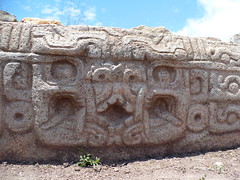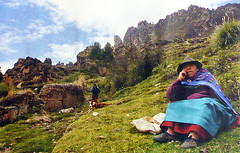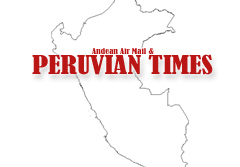The Desert Man of Ica
Lloyd Hannis and two friends venture out into the deserts of Ica under the wing of ‘The Desert Man’, a rough and rugged fossil hunter come tour guide who knows the vast expanse like the back of his hand.
By Lloyd Hannis, Jonathan Parsons and Ben James
“Apologies for the Anglo-Saxon terminology to follow that is necessary to attempt to communicate the full desert experience – no words can really express the various instances of awe, insanity and hilarity along the way.
The three of us turned up in Ica, a city four hours to the south of Lima and on the edge of the desert, late on Friday night. Our bus (Peruvian Royal Class, where the seats embrace you and you’re fed suspect chicken rolls by particularly lovely waitresses) had been delayed by two and half hours, so we were rather late for our projected rendezvous in Harry’s Restaurant with our guide-to-be, Roberto. The taxista took us to the shuttered eatery and we banged on the front for a bit. Suddenly, after a couple of minutes hammering away to no avail, I heard a voice in the distance calling my name … I wandered towards it and located the booming source on the balcony of a big house on the town’s main plaza de armas. This was Roberto Penny Cabrera aka ‘The Desert Man’, or en Espanol, Roberto del Desierto.
“Where have you been?” he shouted down to me, looming imperiously from his balcony. He was a wiry unshaven man, his searing eyes gazing down analytically, getting the measure of me and assessing how I’d hack the desert experience. “Our bus was late!” I meekly replied. He savaged our choice of bus company, telling us to come with PeruBus next time – “Every six minutes!” he said, disdainfully. “Do you have desert food?” he shouted down. “Yes,” I said, “soup, noodles, tuna, biscuits … but we need to buy bread in the morning…”. “I have bread! THIS BIG,” he gestured, staring into the middle-distance, as if he were wistfully describing a wild beast he´d just snared. “Thirty-two! The best bread you’ll taste. You have wine? We can get wine!” And so it went on, conversational shadow-boxing before the bout to come. “Meet me here at seven-thirty exactly!” he barked – and I wasn’t about to disagree. He withdrew from his balcony and I scuttled back to my companions, having had my first brush with the man to whom we’d, in essence, entrust our lives for the next couple of days.
Back at the restaurant, the owner – Harry – had turned up and opened his place to feed us tea. He acts as a sort of agent for Roberto; I’d called him to arrange the trip while Roberto had been in the desert with another group. We had a wide-ranging conversation in broken Spanish, before Harry hailed us a lonely cab to take us to our distant hotel for a good night’s pre-wilderness sleep. Well, it would have been; unfortunately, a bizarre bloke in a balaclava persisted in riding a bike up and down the street outside, blowing a whistle all night. Somebody else, possibly drunk, was shouting incomprehensibly in the street all night. Not to forget the large dog that barked all night and another lady seemed to have locked herself out and was raising all kinds of clamour to try and get back in. We wondered whether the desert man had conspired to soften us up before the real test ahead …
* * *
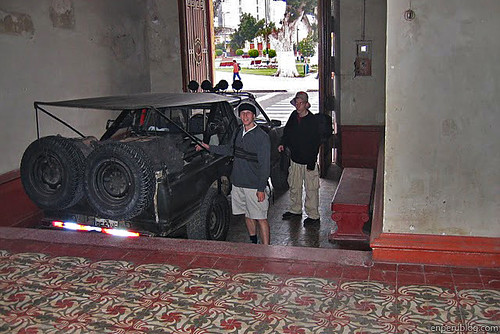
The Datsun
Morning came and we marched into town, backpacks primed, ready for anything, picking up some desert gear – sunhats at 10 soles a piece – along the way, making the stallholder’s day, before it had even turned 7.15! We made it to Roberto’s in plenty of time. The huge door of his Plaza de Armas mansion was wide open and reverberating with the roaring sound of the jeep that was to be our weekend home. Billowing fumes spluttered from a battered Datsun pick-up parked in his porch, a dull-coloured beast with an open back, covered only by an awning. Roberto was warming up his motor, ready for its mission into the back of beyond. We were ushered up to his room, in what turned out to be a grand colonial residence even if it certainly had seen better days. The Cabrera family were instrumental in the foundation of Ica and the dynastical home, at least in part, had been handed down to Roberto. He only seemed to occupy a small room, overlooking the plaza, from where he had spoken to me the previous evening.
His pad reeked of the desert. Behind the door was a bunk-bed, the bottom bunk as substantial as a camp bed and as close to the floor, the top covered in folded gear, military style, all khakis and greens and whites. The walls were covered in maps of the desert, particularly in the far right corner, which featured a satellite imaging map of the entire empty quarter to the south and west of Ica. He gloated as he explained he obtained this high quality map through a friend who hacked in to a top space agencies computer system. And on the left, just inside the door, were arrayed Roberto’s raison d’etre, his life’s work, his drive and motivation for barrelling into the desert a couple of times a week. On a sturdy shelving unit, lovingly lined up in impressive ranks, were dozens of prehistoric sharks’ teeth.
Sharks’ teeth! Who’d have thought that marine relics of the dental variety around 12 million years old could have got somebody so excited! But, oh, how they did! Roberto no longer cared about the little ones, nor even the medium-sized ones that were worth at least $400 if offered to the right people. Roberto was after, quite literally, the big fish. The megalodons. The six, seven, eight inch teeth that could fetch tens of thousands of dollars. He wanted to open a museum. And, as a result of his ongoing quest, nobody knew the desert quite like him.
“I’m a son-of-a-bitch, not a tour guide!” This was the first Roberto pearl of many, laying the law down before we even departed. This wasn’t going to be your softy-softy touristic desert experience, pootling in a couple of miles from local holiday resorts and casting a lazy eye over some rubbish, insignificant fossils. This was the real McCoy. We’d go in deep. We’d go in hard. And, as it turned out, we’d be party to the incessant ramblings of a complete mentalist for a full thirty-six hours. It was to be a weekend we’d never forget.
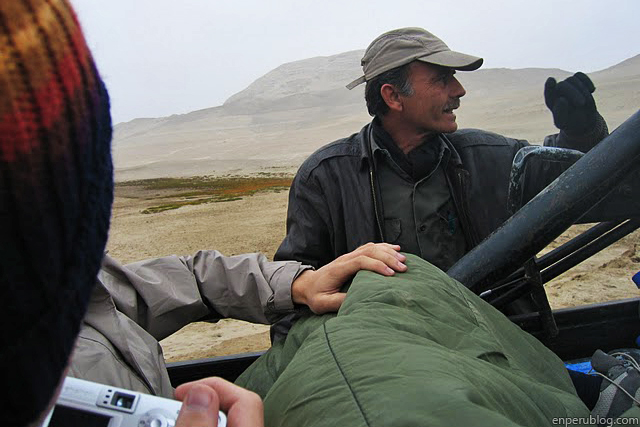
The Desert Man
We hit the road, the three of us huddled in the back against the morning chill. Roberto picked up a ‘friend’ of his – a Peruvian lady named Milagros, around twenty-five years his junior – and off we went together, picking up some provisions on the way. It’s always interesting, browsing a supermarket with a chap like Roberto, because, back home at least, you don’t tend to amble around Asda with a six-inch knife hanging off your belt. The Big R charged around the store, grabbing “desert food”: beans, Peperami-style sausage, tuna fish, mayonnaise, hot rocoto sauce. We bought bottles of cola – “for cola, my friends, is the coffee of the desert!” he’d tell us. We bought litres of Chilean wine that Roberto maintained were necessary for a good night’s sleep beneath the stars.
And off we went, south down the Pan-American Highway for a couple of hours, before a halt for breakfast. Inside a crumbling roadside cafe we found a crumbling old man, who’d parted with most of his teeth years previously and was sporting a thick brown-and-white woollen hat to combat the frigid morning. He doled out coffee to us all and we created the first of many desert sandwiches, upon which we would live over the weekend: tuna, mayonnaise and hot rocoto sauce … Mmmmm. Apparently, our bobble-hatted friend was also a shaman, so if we needed folk remedies for our bones, our blood or any other complaints, he was the man to see. He hobbled off while we drank to visit the local “market” – the back of a lorry that had just pulled up to the remote place to sell supplies.
As we left the last vestiges of civilisation, Roberto continued to blare out his horn. This was his “insurance policy”. Sure, he’d tell the cops that he was off into the desert, and where – “but the cops, they’re assholes! I have a friend, a fisherman. If we get into trouble, I’ll break my truck into pieces and he’ll come and pull us out!” I wasn’t entirely sure what breaking up the truck would achieve, but he was the man and I wasn’t going to argue.
Just up the road, we came to a cemetery at Ocucaje, which was a stark reminder of the realities of Peruvian life and of the country’s recent history. In Spanish style, a matrix of graves reared up at us, a wall 10 metres high stacked horizontally and vertically with the names of the deceased. We looked closer, encouraged by our guide. The dead were all children, many less than one year old. Closer still … In any given year in the seventies, something like forty kids had died, and that was in a settlement of just two thousand people. In recent years, the number had dwindled to just one or two. “Why?” Roberto asked, and in a style we would come to cherish as characteristic, he answered his own question, eyes blazing with opinion. “Fujimori!” Roberto was the second person to tell us that, whether or not he was a crook, a scoundrel and unashamedly power-mad, former President Alberto Fujimori made things work: “He built clinics, he repaired roads, he stopped the terrorists!” A man of action. Roberto approved.
After leaving the cemetery, some moments later on the edge of the desert we were awe-inspired to find Roberto getting out of the truck to tell us of his younger days. Roberto turned out to be a self confessed grave robber, and as we peered out of the back of the truck we could see numerous dips in the sand, a couple of metres in diameter of previous, ancient graves. He retrieved his magic, grave finding steel rod from the back of the truck and proceeded to show us how to go about locating undisturbed graves, and locate them we did ‘but I don’t do this any more, I’m retired,’ he’d tell us. ‘Get in the truck, let’s go’, and we were off again.

Desert landscape
And so, from these cemeteries on the edge of nowhere, we thrust deep into the desert. I was expecting the desert to be a featureless expanse of sand, devoid of landscape, shorn of variety. Instead, we found ourselves beholding an infinite number of subtle variations – great dusty mountains, speckled pebble-dash plateaus, sweeping slopes of fine sand, rough untidy boulder fields. There were places that were nothing short of weird. We saw heaps of white rock spread out like piped quenelles of mashed potato. There were groups of strange platforms that resembled coppiced tree-trunks rendered in dust and stone.

No sign of life
The desert was an empty place. It didn’t take us long to travel to a place where, if you stood upon a high point and looked through 360 degrees, you saw no sign of humanity or any other sort of life, save a dusty jeep, a moody chica and three gangly pale Brits dragging their jaws along the floor at the craziness of it all. And then there was Roberto. When he stopped the truck, he’d typically bound out, scanning the floor and embark upon a hyperactive monologue about “angles”, “playas”, “spoons”, ”consequences” and all the other weird and wonderful terminology with which he classified his desert and his search for sharks’ teeth. When the fact that we were there too crystallised in his head, he’d bark orders for us to ”get out of the truck” and take a look too. Often, just moments later, ”get in the truck” and we on the move again. We were his workers – the deal was that we could keep the small fry that we were bound to find, and, in return, we would possibly help lead him to the dream tooth, the massive megalodon molar of which dreams are made.

Whale fossil
He would use his knowledge of the desert landscape to take us to a promising spot and stride about manically, intensely, then stop and shout: “And now you understand why I’m so fucking smart!!” At his feet would be a couple of perfectly preserved teeth, millions of years old, lying around near the fossilised skeleton of the prehistoric whale that was the shark’s prey. With this guy, the desert was by no means an empty place. He led us to any number of whale skeletons lying on the surface, that had lain there for millions of years, since the time when the whole area formed the bed of part of the Pacific Ocean.
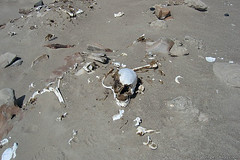
Human remains
He picked up examples of petrified wood, other animal bones and different examples of beautiful geological specimens formed by the unique pressures and conditions at the bottom of the ocean. He even showed us – and I found this even more fascinating – that what seemed to be just more piles of rock, were actually the remnants of camp-sites built by pre-Hispanic peoples in the middle of the desert, trying to eke out their survival in the harshest of conditions. We found examples of their ceramics nearby. We also found a shrivelled up shoe, a few centuries old: previous visitors hadn’t made it out alive.

"Get out of the truck!"
Roberto’s knowledge was based on experience. He was extremely disdainful, to the point of swaggering arrogance, of anybody who had accumulated their knowledge of his desert through the academic medium of text-books. “They say they’re archaeology guys, paleontology guys – I call them fingerologists!” he barked, extending his middle-finger with scorn to ensure we’d made the connection. “They’re fucking assholes!” Nobody, nobody was allowed to tell him anything about the desert which was his patch. He recounted tales of eating in restaurants – which, like any tales of his were surely exaggerated, though probably had a grain of truth in them – in which he had overheard archaeologists (“Very snob!”) making great claims about the cultures or the natural phenomena of the desert. He had put them straight there and then, no bullshit, with all his friends apparently covering their faces and imploring, “no, Roberto, not again …” Exactly true or not, we imagined that he was not the greatest bloke to eat out with or to invite to family gatherings. He said what he thought, and his thoughts were often unpalatable … I’ll steer clear, for example, of recounting his wandering nighttime thoughts about the girl – with the big ass – who works in the grocery shop across the road from him. Mmmm.
After a hard day’s searching, in which we found no huge teeth but a good few tiddlers to whet our appetites, Roberto took us to find a campsite, at about 5pm, with about an hour to go to sunset. What we found was a semicircular collar of mountain, with a sheltered plateau nestling in the clutches of the towering ridges. The sun was about to slip behind the ridge to our left, which would in turn keep the worst of wind off us if a storm whipped up in the night. The open side of our campsite gave a view over mile upon mile of mildly undulating, starkly dessicated beige, dissolving into indistinction at the horizon, where suffocating clouds hung gloomily. We climbed right over one of the ridges as twilight deepened, just to confirm that we really were in the middle of nowhere – absolute emptiness is all directions. We were 100km from Ica, in the deepest part of the desert.
We unloaded all of our gear from the jeep – the food, the comedy “shower” (a battered water tank with some kind of compressed air pump), the stack of firewood, the cushions and sleeping bags. We didn’t need tents, Roberto exclaimed, we’d sleep under the stars. “But first, we need to get drunk!” We started a fire and got on with the business of fine desert cuisine; we hacked open some tins of frijoles and shoved them straight in the fire. Unsurprisingly, Roberto’s nutter streak stretched to pyromania; every time the fire seemed to be receding, he’d lob in a slug of kerosene to make it roar again. (Apparently, when our friends had been on a trip with him a fortnight earlier, he’d tried to start his then conked-out jeep with the very same kerosene…) We made a marvellous feast of those beans, with bread, cereal bars, Peruvian peperami and chocolate chip cookies. Food always tastes better outdoors, even when the combinations are a little bizarre. We’d subsisted for the rest of the day on tuna and chilli sauce brioche rolls – yummy!

The beans were dispatched and the cartons of Chilean wine were cracked open and poured into grubby enamel mugs, as the stars came out above. Such an awesome sky! Miles from civilisation, the constellations – a little different in the southern hemisphere, with an upside-down Plough and all manner of weirdness! – blazed out above our heads, with no interference from any light on the ground below. There were shooting stars too, fleeting bursts that made the magic complete! We settled back with the wine as Roberto trotted out his entire repertoire of mucky Peruvian jokes, shared with us – whether we liked it or not – his profound thoughts and philosophies about most things (but mainly “the womans”), and danced around the camp fire like a madman. The wine ran out and the fire died down and I snuggled inside my sleeping bag, lay back on my cushions and gazed up into the vast starry sky in wonderment of the mind blowing clarity of the Milky Way and the shooting stars before me …
* * *
I woke up and there was a big sandy mountain in front of me. It took a few seconds to remember I was in the desert. I’d had the best night’s sleep of my life, snug in my toasty cocoon, amidst the desert’s infinite silence. It was about the first time I’d ever experience complete absence of sound. And, as promised, the desert wine gave no hangover. Superb.
I unpeeled myself and looked over towards the fire, which Roberto had re-lit to boil water. He was still dancing around, a reminder that sobriety was no obstacle to his lunacy. “This coffee will make you see through fucking walls – like the X-Men!” He had a battered metal campsite coffee filter, into which he piled ground coffee and poured water through it, soaking through little by little. The resulting brew was so thick and diabolical that it needed to be diluted with an equal amount of water to render it drinkable. We added tinned milk to make one of the best cups of coffee in the world ever!
The wind whipped up for the first time at the tail end of breakfast, and I had to make a mad dash up the ridge to retrieve Johnny’s itinerant down sleeping bag, which had decided to take a short flight. We manically collected everything together and tied it down onto the truck, before leaving behind our camp and hitting the sands again – looking, I have to say, very fetching in our desert goggles in the back, to protect against the swirling dust.
 The rest of the day was spent hunting more sharks’ teeth. ”Do you know what is behind that mountain?” he’d ask with his now sad arrogance. ”No Roberto…what´s behind the mountain…?” I’d reply. ”Sand – I hate sand!” he’d detest. We never found a huge, valuable specimen, but did manage to happen upon a 2-incher, which was just lying around, waiting for us. (Conspiracy theory: does crazy Roberto go around the desert planting said teeth the day before each trip?!) Lots of fun, but Roberto’s ramblings started to wear a little thin by the end of the day, and it was good to hit the PanAmericana again and head back towards Ica – albeit with most of the dust of the desert still with us, on our bags, in our hair, up our noses.
The rest of the day was spent hunting more sharks’ teeth. ”Do you know what is behind that mountain?” he’d ask with his now sad arrogance. ”No Roberto…what´s behind the mountain…?” I’d reply. ”Sand – I hate sand!” he’d detest. We never found a huge, valuable specimen, but did manage to happen upon a 2-incher, which was just lying around, waiting for us. (Conspiracy theory: does crazy Roberto go around the desert planting said teeth the day before each trip?!) Lots of fun, but Roberto’s ramblings started to wear a little thin by the end of the day, and it was good to hit the PanAmericana again and head back towards Ica – albeit with most of the dust of the desert still with us, on our bags, in our hair, up our noses.
We stopped by Harry’s restaurant for a bite to eat, before The Big R took us for one last short excursion to the nearby oasis of Huacachina. This place needed seeing, if only briefly, we had been told. We weren’t disappointed, for around the dingy pool and tatty-looking hotels and restaurants are the biggest sand dunes I have ever seen! They tower around the oasis on all sides, like big hills; it’s impossible to believe they’re just piles of sand! Big dunes attract big sandboarders and we spent a pleasant half hour in the dusk watching thrillseekers throw themselves down the slopes, before heading back to Ica where he thought it appropriate to tell of his two broken marriages to be followed by Roberto´s ultimate pearl, ”but I don’t give a shit!”
We rolled back into town with Roberto sounding his train like horn a few times to announce his return, and then it was goodbye to Roberto. He almost seemed sorry to see us go. The Fellowship was broken and there were heartfelt, manly, desert hugs all round. It had been an adventure and a half plunging into the unknown with this unhinged man, something me and the boys are not going to forget in a hurry … Four hours later, we got off a coach back in the misty, smoggy damp of Lima, and wandered if it had all been a dream …!”
 If visiting Lima any time soon, perhaps passing through on your way to the Ica desert, consider having any dental work you might need carried out by world-class professionals at Travel and Smile for a fraction of the cost and where English is spoken.
If visiting Lima any time soon, perhaps passing through on your way to the Ica desert, consider having any dental work you might need carried out by world-class professionals at Travel and Smile for a fraction of the cost and where English is spoken.



![Destruction of Lima’s architectural heritage [Featured]](http://farm4.static.flickr.com/3160/2691988362_279cb28028_m.jpg)
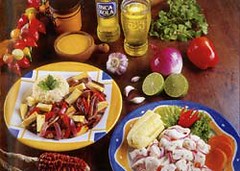
![Barbara ends up doing the Whipping Dance [Featured]](http://farm2.static.flickr.com/1306/1337818770_17d1f42c05_m.jpg)
